Every so often, a creator’s work just grabs your attention and there’s a compulsive need to read every scrap ever produced by this individual. It’s happened to me, certainly. One of the strongest pulls in recent days has been for the work of Ignatz-winner Noah Van Sciver, who, in the last several years, has produced a canon of work that rivals some of the best of independent cartooning. His works run the gamut: serious character studies (Saint Cole), historical fiction (The Hypo: The Melancholic Young Lincoln; Johnny Appleseed), contemporary satire (the Fante Bukowski series), and personal reflections of his life laid bare for prying eyes. Like his work, Noah is a humble but philosophical, laid back but serious about the art of comics. A true auteur, Noah writes and draws stories that touch on the mundanity and fantastic elements that we encounter in our lives.
All the more remarkable is that the level of excellence has remained consistent, if not growing, with each book. Besides publishing graphic novels with Fantagraphics and Uncivilized Books, Noah’s anthology series Blammo continues to documents the development of an artist who is never satiated with what came before; every turn of the page is a new opportunity for growth.
I was fortunate enough, in the maelstrom that is the San Diego Comic Con, to chat with Noah about the diversity and breadth of his current work, his upcoming graphic biography of Mormonism’s founding prophet Joseph Smith, and why he includes Limp Bizkit references in his books.
FROST: Hi Noah. So great to talk to you today from the middle of the San Diego Convention Center. Can you tell me about your experience so far? As I understand it, this is your first Comic Con?
NOAH VAN SCIVER: Yeah it’s mostly been hiding in my hotel room and coming out only when I have to when I’m responsible to do something. But then I go back to my hotel room and hide out again.
FROST: Right before we sat down to chat, you just had your spotlight panel. How does it to feel to be invited to not only be a special guest, but to have a spotlight panel that showcases your talent?
VAN SCIVER: I feel like an imposter. Like they didn’t realize who they were inviting so maybe I shouldn’t be here. You know, it’s a mainstream show and I always feel kind of out of place at mainstream shows. It’s very overwhelming. But I’ve been able to deal with it so far, but there’s still two more days right?
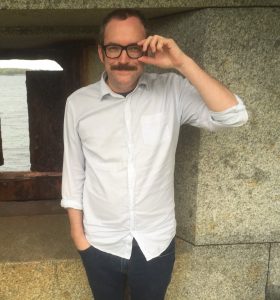
FROST: I think it’s so interesting that, not only did they invite you out, but you really just have all this unique stuff going on. You’re so busy (and prolific). This last year alone, you’ve already come out with Fante Bukowski Two, and in a few months your memoir One Dirty Tree and Fante Bukowski Three coming out. Can you talk about all that juggling and all that all that writing and all the promotion and commotion with all the new stuff you’re also working on right now?
VAN SCIVER: Well, honestly I feel like there’s no promotion. I don’t know what to say. But how you do a lot of books is: By the time you’re getting towards the end of one project, you start the new one and you don’t wait until you’re already finished before you start something new. You have to have a few plates spinning at the same time. So while I’m working on Fante Bukowski Three, I might be working on the new issue of Blammo (and that gives me a good break from working on Fante). It’s a healthier way to go… for me anyway.
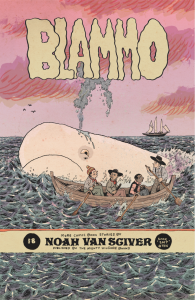
FROST: You just released with the tenth issue of Blammo. What was it like getting to that milestone? You’ve been releasing about one a year, right?
VAN SCIVER: For the most part, yeah.
FROST: Can you talk about the process of making BLAMMO and how it feels to wrap up each new issue? And how. Now it feels like to finish up.
VAN SCIVER: Every issue has to be the very best that I can do. Every story has to be greater than the last issue or the last story I did because it’s supposed to represent me at that period of time. So each year, a reader can go back and see what kind of an artist I was. I take it very seriously; it’s my most important piece of work. It’s kind of like putting a journal out in the world. Everything is meaningful; every story should fit together. It’s a cohesive unit that I put a lot of thought into. And it feels crazy that I’ve been doing it for ten years now because it was just a self-published comic book that I started in my early 20s and it keeps going.
FROST: What is it like to you look back to issue number one and compare it with the latest issue? What do you see? And what do you see not only as your evolution as an artist, but also your holistic growth as a person as well?
VAN SCIVER: I see the work of a young man who wanted to draw, but didn’t necessarily know what he had to say.
FROST: This year, you have two upcoming books. As I said earlier, you have One Dirty Tree published by Uncivilized Books, which comes out in October. That’s your first memoir, correct? What can you tell us about it?
VAN SCIVER: The first one, yeah. It’s probably the book that I’m most uncomfortable about being published.
FROST: Why?
VAN SCIVER: Because it’s very open. The book talks about a lot of things in my family that maybe shouldn’t be talked about. You know you’re exposing your family when you talk about your upbringing.
Maybe that’s not so respectful, so I have some reservations about it. But at the same time, I did it. And it’s already out there. I started working on it and releasing material from it from my Patreon page when I had one; it was like a private club where I felt that people were paying and I’m going to give them something every day. I posted a different page on there and it was it was like I was exposing a lot of stuff about my upbringing. Different feelings about my family breaking apart and that kind of thing. But when it came time to print, I knew that a lot of that material I just couldn’t bear to publish, so I cut some of that out. And I restructured the book. It still reveals the same things but it’s not going to anger so much of my family.
FROST: I mean when it comes to an artistic pursuit like that, do you have to follow your gut or your heart?
VAN SCIVER: A little of both, honestly.
FROST: Can you elaborate on that?
VAN SCIVER: Your heart tells you what’s going to hurt someone’s feelings, while your gut is telling you that what you’re doing is probably not the wisest thing to put around the world. It’s a combination.
FROST: Also this year is Fante Bukowski Three, the concluding chapter of the Fante saga (or the beginning of the Fante Cinematic Universe). What are your final thoughts on the character and the wrapping up of his arc?
VAN SCIVER: I really feel like there was growth with that character. If you read the first book and then compare it to the final book, he’s a different character. He’s grown. He’s more mature and he’s not as angry anymore. And I feel that he’s more at peace with things, or at least, more realistic about things in his life. I’m proud of it. And I feel that when people read all three of these books together, they’re going to see that arc and it’s going to come together really nicely as one story.
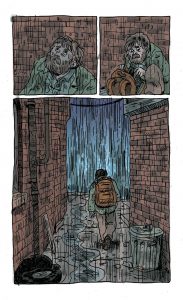
FROST: Would you say that the Fante books are a bit of a satire about the publishing world, or just struggling artists in general?
VAN SCIVER: Yes, absolutely. I put so much of my own experiences and feelings about things into those books. I made fun of so much, and that’s why it rings so true to a lot of people who are involved in the industry and who are in that scene because they know those things. They’ve all had experiences like Fante has.
FROST: What do you think of the Noah Van Sciver character? [NOTE – A fictionalized version of Noah appears in Fante Bukowski Two as a jealous, self-involved myopic boyfriend to Fante’s love interest, Audrey].
VAN SCIVER: I think it’s hilarious that some people actually believe that that’s me. It’s an exaggerated version of myself that’s just for humor. But I know that there are people out there that think I actually am, like a big jerk or something, you know?
FROST: You’re definitely not. Okay, but I had this lingering question from reading your work: There are two distinct references—in Saint Cole and Fante Bukowski Three—to Limp Bizkit. What’s going on there?
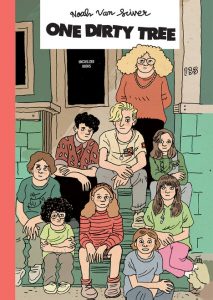
VAN SCIVER: Oh really? [Laughs]. You know it’s funny, with that Saint Cole scene, that was the one page that when I was getting ready to send the file off to Fantagraphics and I kept thinking, ‘What can I replace this with?’ Because I felt like it doesn’t fit in this book. But I couldn’t figure out anything to put in that place, so I just left it in there. It’s the one thing I always think about: if I can change anything about that book, I would get rid of that. I just think Limp Bizkit is a really funny band and it represents a really funny period of time for American culture.
FROST: Did they mean anything to you growing up?
VAN SCIVER: Yeah, it was like the anthem. I mean, their music was the soundtrack for ‘90s skater kids in that trashy culture of Mesa, Arizona. There was this band that was really popular locally called Chronic Future and they had this song called ‘Scottsdale Gangster’ or something. It’s hilarious because Scottsdale’s a nice area.
FROST: I’m from Scottsdale, haha.
VAN SCIVER: The song… it’s so funny. It’s these two white kids trying to be edgy and trying to rap. Oh my God, it’s so embarrassing.
FROST: My friends and I did that too, as a joke.
VAN SCIVER: [LAUGHS]
FROST: Let’s look to the future for a moment. At this moment, you are working on a graphic biography of Joseph Smith. I believe you’ve said elsewhere that this a passion project. Why did you want to write this book? And what does Mormonism mean in your life?
VAN SCIVER: I was raised in the Mormon religion, so this journey goes back to the past few years. I’ve been doing a lot more self-exploration comics and One Dirty Tree is an example of that. The past several issues of Blammo were about exploring my own life. Basically, I was just trying to figure out who I am as a human being and where it all came from, so I can know myself and improve myself. And a lot of that is: What is this religion that I was raised in? What is that all about? I’m interested in figuring that out and learning about it and sharing it.
FROST: It’s so interesting because, a few years ago, Mormonism was really in the zeitgeist because of the book The Book of Mormon Broadway show and the presidential candidacy of Mitt Romney. But now it’s tapered off a bit. Not a lot of people really think that there are Mormons working in comics except for maybe like Mike Allred. What are your thoughts on the intersection of Mormonism and graphic storytelling?
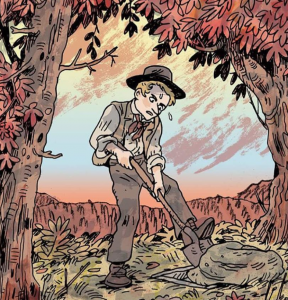
VAN SCIVER: I think it hasn’t been touched really; nobody’s done it. It’s so fascinating and there’s such an interesting history to it. And it’s so American, which is the really interesting part about it to me. It represents all these people who were in this country who didn’t know the history of the country they were living in. They were trying to figure out what this new land’s place was within Christianity. They were just like: “Well, we have to basically invent it for ourselves.” Joseph Smith was only one of those people that was claiming to be a prophet at that time. And for some reason, his teachings stuck, maybe because it was so tied in with the notion of how to explain what all these Native American mounds are about and explain who these Native American people are. He felt like he was giving everybody the answers that everybody was asking for.
FROST: I don’t want to go into theology, but I’ve always felt that Joseph Smith—no matter what you think of him some of the more controversial aspects of the early Latter-Day Saint movement—definitely had a bit of religious genius. You know, how does one build a religious movement, but one that also continues and flourishes? Mormons are still, now, such a vibrant and embedded part of our American culture, our political culture, and our popular culture. Just like comics.
VAN SCIVER: I’m still trying to figure it all out myself. And that’s what this project has been about for me. And it’s probably one of the most enjoyable books I’ve ever worked on. Every day, I learn something new about it that’s so fascinating. And I just feel so lucky that nobody has gotten to it before me. So I’m going to just do my best to create one of the greatest graphic novels I can possibly make.
FROST: Any final thoughts about San Diego Comic Con, or anything else?
VAN SCIVER: This Con is great. I hope they have me back.


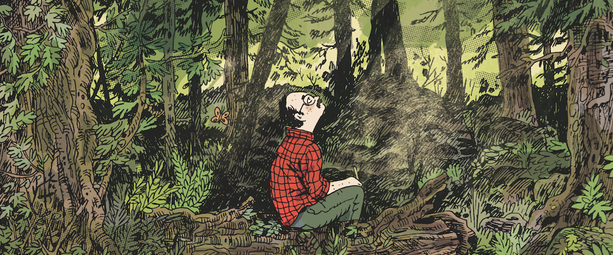
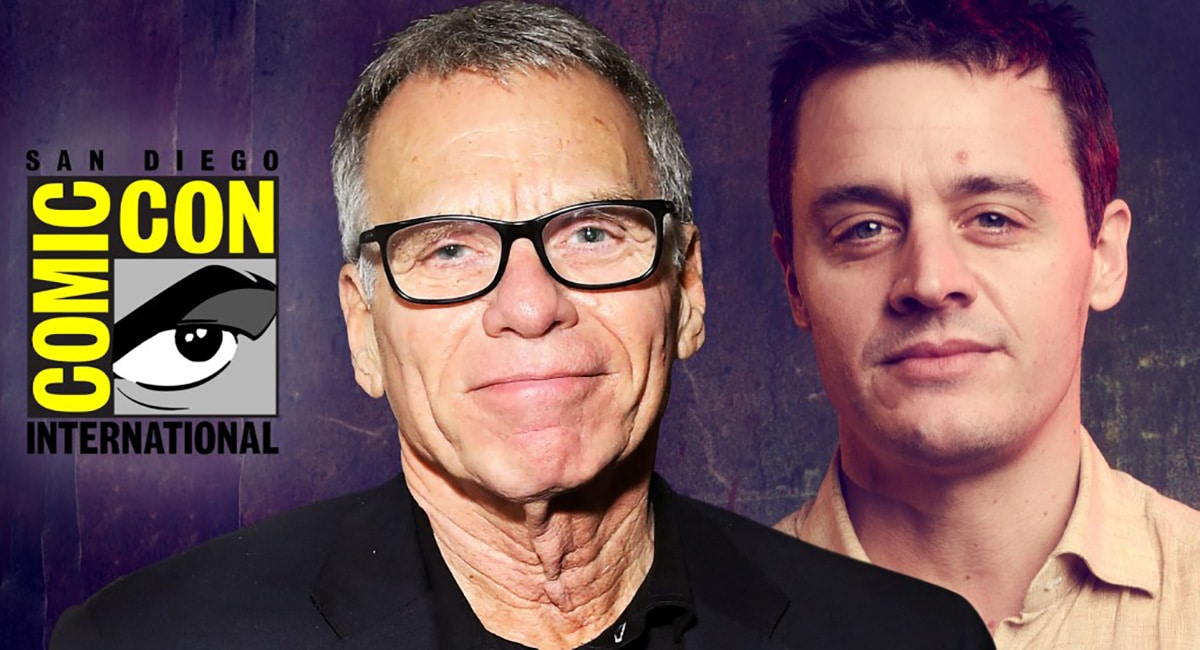

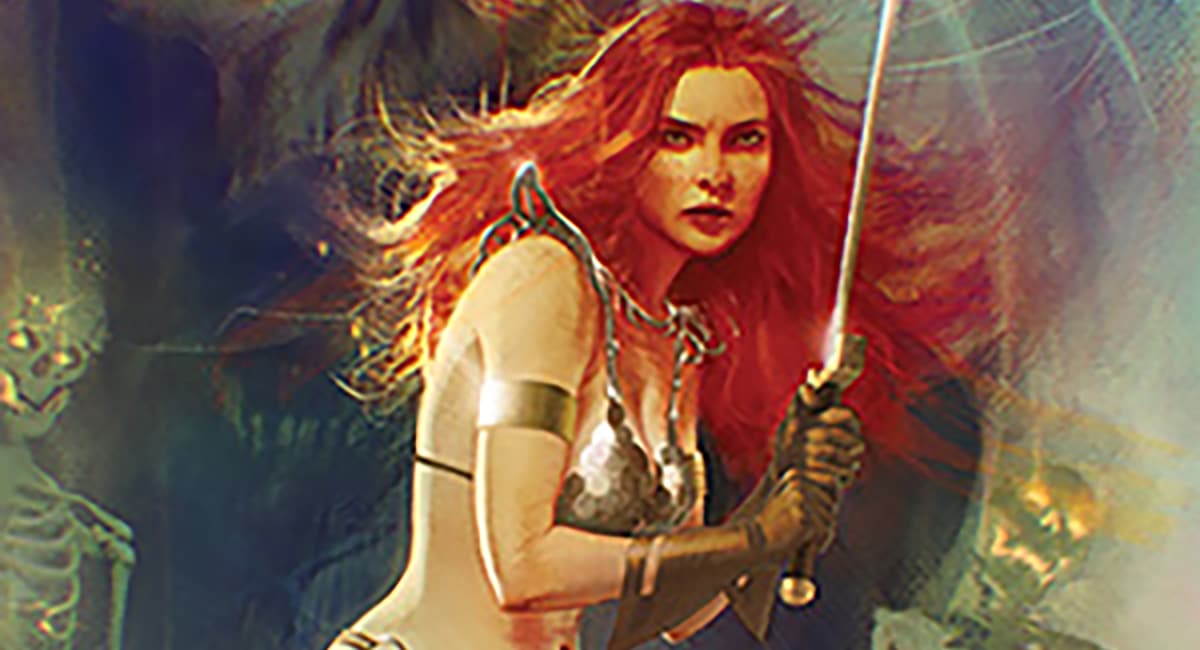
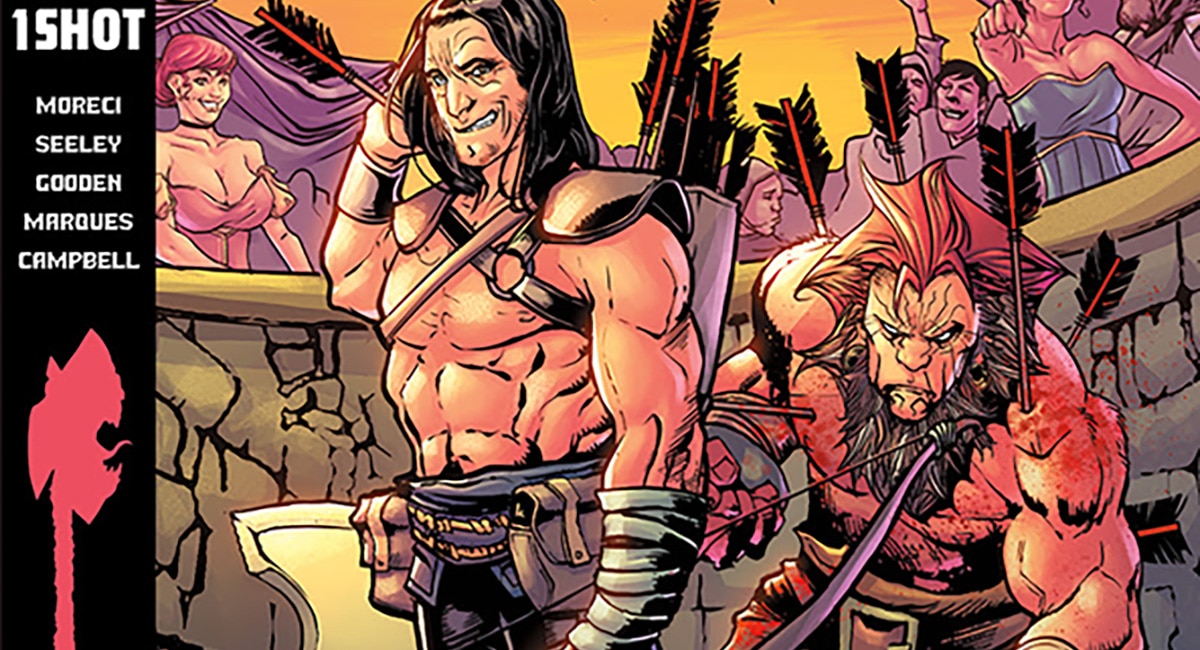

Since his upcoming book is a memoir, did anyone ask about how his brother became such an asshole?
Comments are closed.